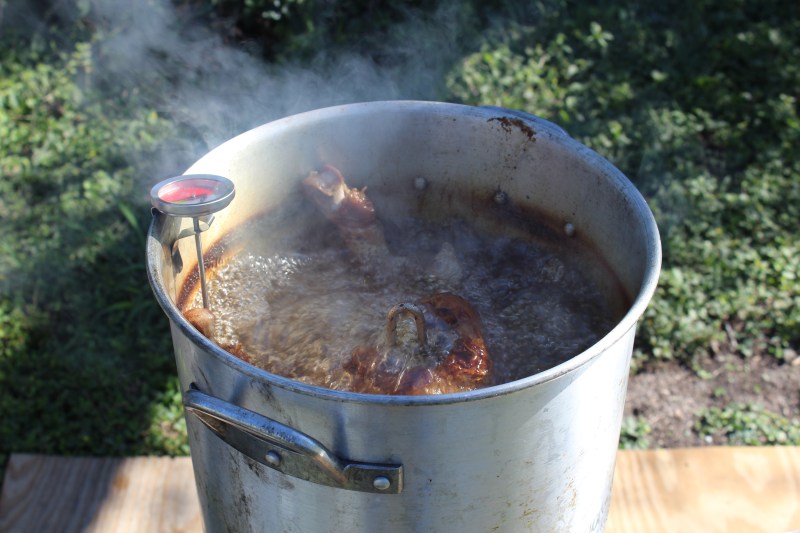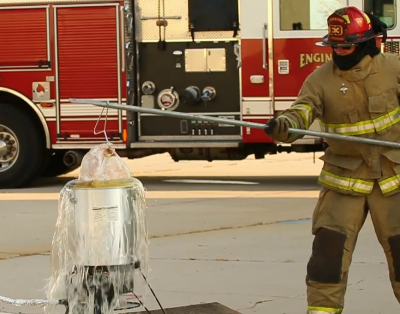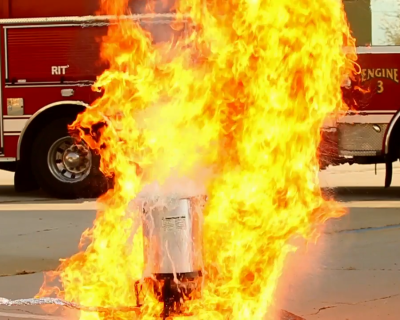
Tomorrow is Thanksgiving and that means Americans across the United States will be cooking up a turkey feast. One of the most popular ways to cook the bird is by deep frying it in oil.
Local TV stations everywhere spend this week warning about turkey frying. They’re not wrong… if things get out of hand you can end up burning down your house, if not your entire street. Let’s talk the science behind November turkey fires, and hopefully avoid a turkeyferno.
Simple Errors
The typical setup for deep frying a turkey involves lowering the bird into a big pot full of oil sitting on a gas burner. Ropes and pulleys are often used to lower the turkey into the pot to avoid getting one’s hands near the hot oil. Ideally, this should be done in a backyard, away from structures, to provide good ventilation and plenty of room in the case something does go wrong.

It all sounds fairly straight forward, but there are two ways that this often goes wrong, leading to leaping flames and calls to the fire department. The first of all is simple: overfilling. Lowering a turkey into oil will necessarily displace that oil. A pot filled to the brim will thus overflow the second the turkey enters the pot, with hot oil streaming down the sides of the cooking vessel directly towards the gas burner below. It’s a beginner’s mistake, but one that happens all too often. To avoid this, it’s important to account for the volume of the turkey before dropping it in the pot, to avoid starting a conflagration.
The second major cause of turkey fires is from attempting to deep fry a frozen turkey. The ice on the frozen turkey quickly turns to steam when it comes into contact with the hot oil. The steam rapidly expands, creating bubbles and quickly throwing hot foaming oil all over the place. This can easily cause severe burns by itself, but the presence of a gas burner only increases the danger. The hot aerosolized oil typically catches fire, either from the burner itself or simply the hot surfaces in the vicinity, and quickly creates a huge fireball.

It’s similar to the way molten aluminium reacts poorly with water and leads to dangerous foundry explosions, albeit without the chemical reactions that happen in the aluminium case. It’s a simple fact that letting excess ice or water come into contact with hot liquids above 212°F often leads to disaster.
Thankfully, these issues are similarly easy to avoid with the proper forward planning. The first step is to properly defrost the turkey, which usually takes at least 24 hours in the refrigerator per 5 pounds of meat. Check the inside and outside of the turkey for ice crystals to ensure it’s defrosted all the way through.
Water can then be used as a simple way to check for the proper oil level. Put the turkey in the frying pot, then fill the vessel with water up to a safe level. Remove the turkey, and note the level of the water remaining in the pot. This is how much oil you must put in the pot.
Keeping the oil at or below 350°F makes fire less likely and also avoids spoiling the turkey with nasty burnt oil flavors. Additionally, a great tip that few people think of is to turn off the gas burner before lowering the turkey into the oil. That way, if there is a spillage or other accident, there’s a much better chance that the oil won’t ignite. Once the turkey is safely nestled in the fryer, it’s a simple matter to light it back up again.
It also pays to have a fire extinguisher on hand suitable for cooking oil and fats. Wet chemical extinguishers are the most effective against these fires. A fire blanket can also be a useful in such situations. Plus, if you’ve chosen you’re spot well, and you’re not deep frying in a garage, under a patio or on a wooden deck, it’s less likely any incident will get out of control.
Avoiding hot burning oil spraying all over your guests and backyard is often cited as key to enjoying any holiday season, not just Thanksgiving. Thus, armed with this knowledge and the tips we discussed today, you should be ready to deep fry your turkey for Thanksgiving with an absolute minimum of personal injuries and property damage. Eat well and have fun out there!
P.S. Get it defrosting now! Don’t wait!
0 Commentaires